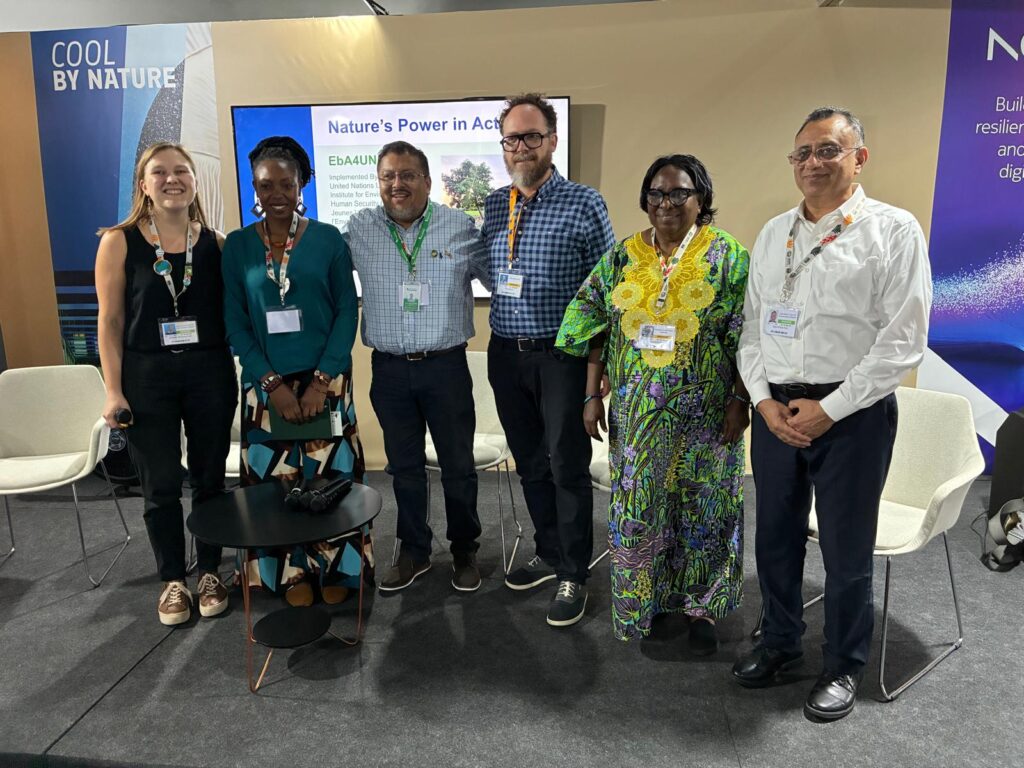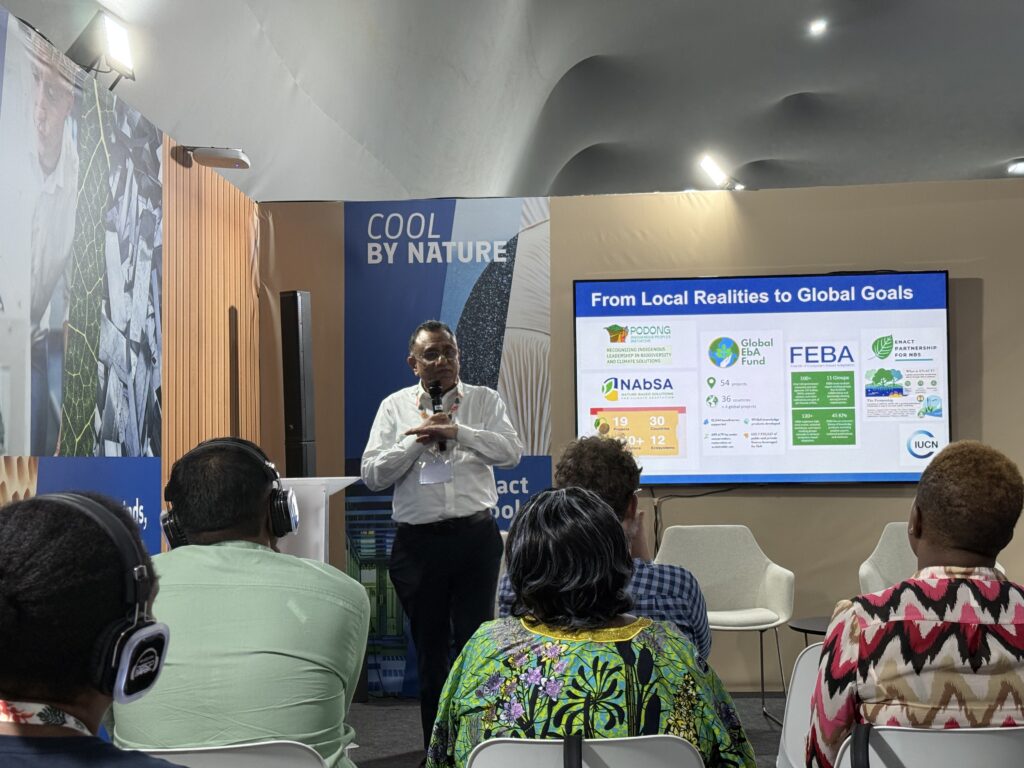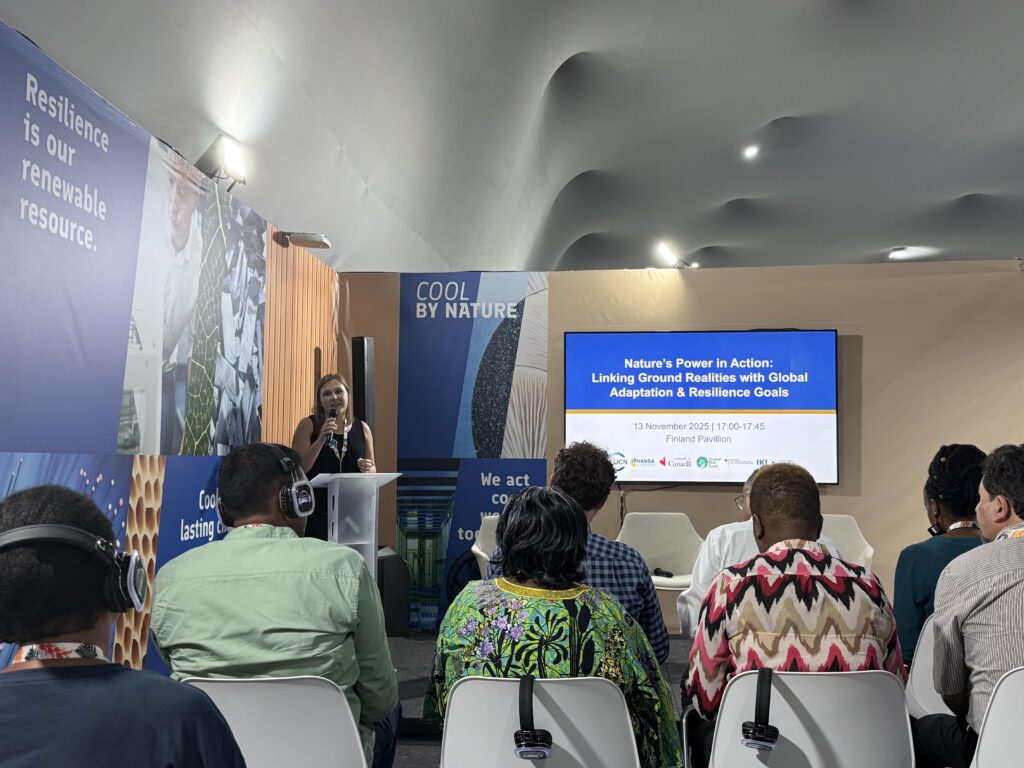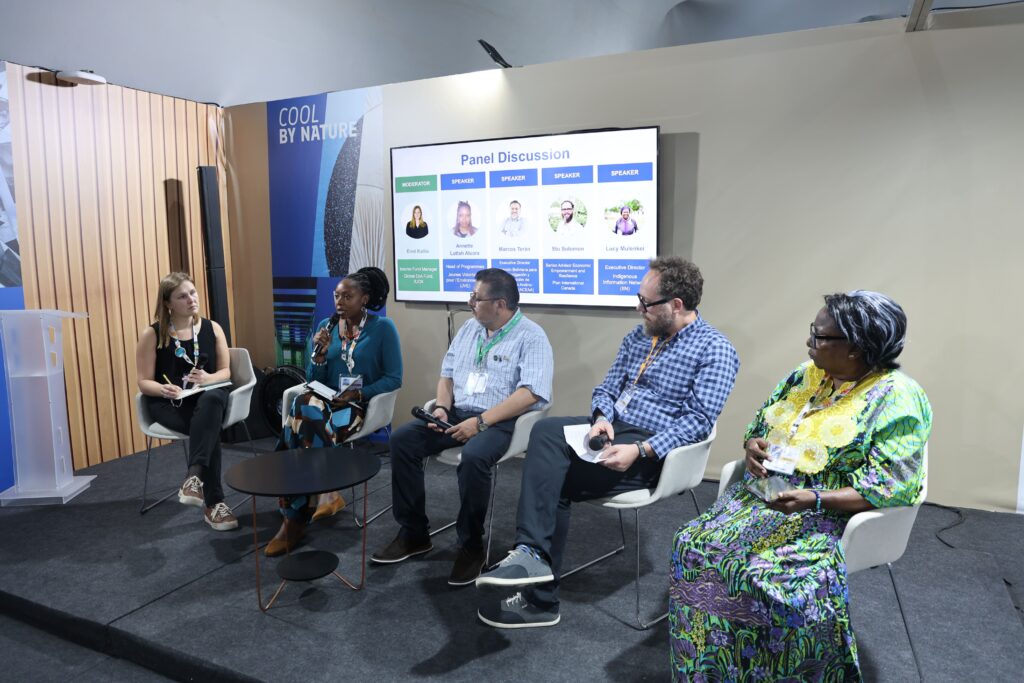El poder de la naturaleza en acción: Vinculando las realidades sobre el terreno con los objetivos globales de adaptación y resiliencia.

13 de noviembre de 2025, Belém, Brasil, UICN – En la COP30, donde se insta al mundo a cumplir con la visión del “Mutirão Global” de acción colectiva orientada a la búsqueda de soluciones, el Equipo Global de Cambio Climático y Transición Energética de la UICN reunió a socios de todos los continentes para demostrar un mensaje poderoso: la adaptación local liderada por la comunidad e impulsada por la naturaleza ya está mejorando vidas y paisajes y transformando la ambición global, y tiene el impulso para ampliarse.
El evento reunió a profesionales, líderes indígenas, investigadores, jóvenes activistas y responsables políticos que impulsan la resiliencia climática a través de la iniciativa Soluciones Basadas en la Naturaleza para la Adaptación al Clima (NAbSA), el Fondo Mundial para la Adaptación Basada en los Ecosistemas (Fondo Mundial EbA) y la Iniciativa de Pueblos Indígenas PODONG. Estas iniciativas demuestran cómo la adaptación basada en los ecosistemas e impulsada por la comunidad puede responder directamente a los impactos climáticos, a la vez que acelera el progreso hacia el logro del Acuerdo de París, el Objetivo Global de Adaptación (OGA), el Marco Mundial de Biodiversidad Kunming-Montreal (KMGBF) y la Alianza para el Fortalecimiento de las Soluciones Basadas en la Naturaleza para una Transformación Climática Acelerada (ENACT).
Preparando el terreno: La Adaptación basada en Ecosistemas (AbE) como motor del cambio sistémico
Apertura de la sesión, Ali Raza Rizvi, Director Un miembro del Equipo Global de Cambio Climático y Transición Energética de la UICN recordó a los participantes que los objetivos relacionados con el clima, la biodiversidad y el desarrollo no pueden abordarse de forma aislada.
Hizo hincapié en que la Adaptación basada en Ecosistemas (AbE) ha demostrado su eficacia a través de beneficios ecológicos, sociales y económicos, pero su impacto depende de la colaboración. Desde el Fondo Mundial para la AbE, NAbSA y PODONG hasta la Red de Amigos de la AbE (FEBA) y ENACT, destacó cómo la UICN trabaja con gobiernos, pueblos indígenas, redes juveniles y fondos multilaterales para subsanar las deficiencias de conocimiento, fortalecer los marcos e integrar la AbE en las negociaciones climáticas.
Su llamamiento a la acción fue claro: “Explorar las herramientas, la evidencia y las alianzas que surgen de estas iniciativas. Ampliar la adaptación requiere una responsabilidad colectiva.”

Presentación del Marco Operativo de NAbSA
La sesión incluyó el lanzamiento de Vídeo del marco operativo de NAbSA, una introducción a un enfoque práctico y comunitario para diseñar e implementar acciones de adaptación y resiliencia en materia de naturaleza y clima.
El marco:
- Proporciona un enfoque práctico, integrado y centrado en la comunidad para fortalecer la adaptación y la resiliencia a través de acciones en materia de naturaleza y clima; es flexible y adaptable a diversos contextos;
- Se basa en el respeto a los derechos humanos y apoya el diseño, la implementación y el seguimiento de las acciones;
- se alinea con los tres Convenios de Río y apoya su aplicación;
- Se basa en las lecciones aprendidas de los proyectos de adaptación y resiliencia apoyados por la iniciativa Alianza para el Clima de Asuntos Globales Canadá;
- Está concebido para ser una pieza más de un conjunto de herramientas que incluye un documento resumen, el marco operativo completo con orientación experta detallada, un programa de formación para profesionales y una plataforma en línea que servirá como repositorio de estudios de caso, datos, soporte técnico y documentación.

Mesa redonda: Realidades, innovaciones y vías de transformación
Moderado por Enni Kallio, responsable de programas En la UICN, el panel mostró la riqueza y diversidad de las acciones de adaptación apoyadas por NAbSA, el Fondo Mundial para la Adaptación a los Ecosistemas del Abeto y PODONG.
Jóvenes, mujeres y restauración forestal con múltiples objetivos
Desde Togo, Annette Luttah Aluora de Jóvenes voluntarios para el medio ambiente (JVE) destacó cómo la cocreación con las comunidades, especialmente con mujeres y jóvenes, impulsa la apropiación y el éxito a largo plazo en Restauración de Bosques y Paisajes (FLR).
Mediante la investigación de campo para comprender el contexto local —desde la composición del suelo hasta las condiciones sociales y el conocimiento indígena— JVE —en colaboración con UNU-EHS— ayuda a las comunidades a planificar la restauración del paisaje forestal (FLR, por sus siglas en inglés) de manera que se cumplan simultáneamente los objetivos de la Alianza Mundial para la Conservación de la Tierra (GGA, por sus siglas en inglés), el Marco de Referencia para las Tierras de Kenia (KMGBF, por sus siglas en inglés), el Marco de Sendai y el Marco Conceptual de Neutralidad en la Degradación de la Tierra (LDN, por sus siglas en inglés) de la Convención de las Naciones Unidas de Lucha contra la Degradación de la Tierra (UNCCD, por sus siglas en inglés).
Su mensaje subrayó un tema central del evento: las soluciones de restauración impulsadas localmente y creadas conjuntamente desbloquean sinergias entre los marcos globales.
Evidencia de las líneas del frente andino-amazónicas
Desde Bolivia, Marcos Terán, de Asociación Boliviana para la Investigación y Conservación de Ecosistemas Andino-Amazónicos (ACEAA), demostró cómo las regiones boscosas densamente pobladas de la Amazonía boliviana se están adaptando a las presiones climáticas. ACEAA trabaja con las comunidades El proyecto busca diversificar los medios de vida locales mediante productos forestales no maderables como la nuez de Brasil y la palma de açaí. Combinando el conocimiento indígena con la evidencia científica, el proyecto ha documentado el impacto del cambio climático en la producción de estos productos y colabora con las comunidades locales para fortalecer los enfoques de Adaptación basada en Ecosistemas (AbE) y diversificar sus medios de vida.
Hizo hincapié en la necesidad de contar con evidencia sólida sobre el terreno que demuestre cómo el cambio climático está afectando las cadenas de valor de los valiosos productos forestales no maderables y los medios de subsistencia locales. Incorporar estas realidades locales a las políticas y las negociaciones climáticas internacionales es fundamental para establecer vínculos sólidos.
Adaptación con perspectiva de género
Stu Solomon Plan International Canadá destacó que muchos proyectos de adaptación y enfoques basados en la naturaleza no tienen en cuenta los aspectos sociales.
A través de la naciente Iniciativa de Justicia de Género, su equipo aborda barreras como la carga de cuidados no remunerada, la falta de confianza derivada de las normas sociales y las estructuras de gobernanza que ignoran las perspectivas de las mujeres. Mediante la sensibilización y el fortalecimiento de capacidades con las comunidades locales, fomentan la confianza y transforman perspectivas y comportamientos para impulsar la participación de las mujeres en la acción sobre el terreno, así como en la toma de decisiones a nivel local y nacional. Solicitó mayor financiación para el conocimiento indígena y la adaptación transformadora en materia de género, recalcando la necesidad de integrar las dimensiones ecológica, social y de gobernanza.
Conocimiento indígena y la iniciativa Podong
Cerrando el panel, Lucy Mulenkei, Directora Ejecutiva de la Red de Información Indígena (IIN) y Copresidente del Foro Internacional Indígena sobre Biodiversidad (IIFB), habló sobre el PODONG La iniciativa de los Pueblos Indígenas —liderada por la UICN, el IIFB y las Organizaciones de Pueblos Indígenas (OPI) miembros de la UICN— constituye un ejemplo real de codiseño, cocreación y coimplementación para fortalecer el liderazgo indígena, garantizar el acceso directo a la financiación y unificar los sistemas de conocimiento científico e indígena. Esta iniciativa se creó para asegurar la participación plena y efectiva de los Pueblos Indígenas en la toma de decisiones sobre las agendas mundiales de clima y biodiversidad.
“Podong”, que significa cestaSimboliza un espacio compartido donde los recursos, el conocimiento y la colaboración se unen para apoyar la acción de conservación liderada por los pueblos indígenas. La iniciativa está actualmente activa sobre el terreno en Guatemala, Kenia, Nepal, Panamá y Tanzania, demostrando cómo el liderazgo indígena fortalece la implementación del Marco Global para la Conservación (GBF, por sus siglas en inglés) y los objetivos globales de adaptación.

Cuatro mensajes clave para las agendas políticas de la COP30
Este evento paralelo encarnó la esencia de la agenda de la COP30, destacando cuatro mensajes clave a partir de ejemplos concretos y acciones sobre el terreno:
- Acelerar la adaptación y la resiliencia exige financiación directa a los socios sobre el terreno; acceder a la financiación climática a gran escala es complicado y facilitar el acceso a la financiación es clave para acelerar la acción climática sobre el terreno;
- El fortalecimiento de la acción climática basada en la naturaleza y en los derechos comienza con la generación de conocimiento desde el terreno y la comprensión de las realidades sobre el terreno;
- Fomentar la inclusión, la igualdad de género y el liderazgo indígena es esencial para garantizar la sostenibilidad a largo plazo de las soluciones desarrolladas; es necesario cerrar la brecha entre las agendas de la naturaleza, el clima y las personas;
- Conectar las realidades de la comunidad con las políticas globales comienza por contar las historias y mostrar el impacto: se están haciendo muchas cosas sobre el terreno, pero estas innovaciones y soluciones locales no se incorporan a las políticas globales.
Al dar voz a organizaciones comunitarias, redes indígenas y financiadores globales, el evento reafirmó que la adaptación basada en la naturaleza no solo es posible, sino que ya es una realidad. Lo que se necesita ahora es mayor escala, inversión y compromiso político.
Mirando hacia el futuro
A medida que la Iniciativa de Pueblos Indígenas PODONG continúa creciendo, el Marco Operativo de NAbSA entra en su fase de perfeccionamiento y el Fondo Mundial EbA continúa generando lecciones aprendidas y avanzando hacia su ampliación, la UICN y sus socios invitan a gobiernos, donantes y profesionales a unirse a esta creciente comunidad de práctica.
En conjunto, estas iniciativas contribuyen a un futuro donde la adaptación se base en los ecosistemas, esté moldeada por las comunidades, guiada por los derechos y alineada con las ambiciones de resiliencia global.
Para obtener actualizaciones continuas, recursos y oportunidades de colaboración, consulte las siguientes iniciativas:
NAbSA Apoya soluciones de adaptación al cambio climático con perspectiva de género y respetuosas con la biodiversidad en comunidades vulnerables del África subsahariana y América Latina. Mediante capacitación, intercambio de conocimientos y asistencia técnica, impulsa la acción local y contribuye a la configuración de marcos globales de soluciones basadas en la naturaleza (SbN). NAbSA es una colaboración entre la UICN y Asuntos Globales Canadá en el marco de su iniciativa Alianza para el Clima (P4C).
Con una cartera de más de 50 proyectos, la Global EbA Fund Proporciona financiación catalítica para proyectos innovadores que amplían la adaptación basada en ecosistemas. Al subsanar las deficiencias de conocimiento y facilitar la inversión política y del sector privado, fortalece la resiliencia de las comunidades y los ecosistemas en todo el mundo. Está financiado por la Iniciativa Internacional para el Clima a través de Alemania y cogestionado por la UICN y el PNUMA.
El Asociación ENACT es una alianza global que acelera las Soluciones basadas en la Naturaleza (SbN) para Aborda las crisis climática, de biodiversidad y de degradación de la tierra. Reúne a gobiernos y actores no estatales para conservar la naturaleza, fortalecer la resiliencia de mil millones de personas e impulsar los objetivos integrados de la Convención de Río. Está copresidida por Egipto y Alemania en colaboración con la UICN.
Coordinado por la UICN y apoyado por Alemania a través de la Iniciativa Internacional para el Clima (IKI), Amigos de EbA (FEBA) Conecta a más de 115 organizaciones que impulsan la adaptación basada en ecosistemas, entre ellas ministerios gubernamentales, organismos de la ONU, organizaciones de la sociedad civil, ONG y centros de investigación. Como centro global, proporciona productos de conocimiento, reúne a grupos de expertos y organiza eventos que fortalecen el papel de la naturaleza en las políticas y estrategias de adaptación climática a nivel mundial.
El Iniciativa de los pueblos indígenas PODONG La iniciativa sitúa a los pueblos indígenas como titulares de derechos y líderes en soluciones para la biodiversidad y el cambio climático. Canaliza recursos directamente a las comunidades y apoya acciones diseñadas en colaboración con los poseedores de conocimientos tradicionales. Amplía el impacto de las iniciativas lideradas por los pueblos indígenas en el marco del Marco Mundial de la Diversidad Biológica, el Acuerdo de París y la Agenda Mundial para los Pueblos Indígenas de la UICN.
